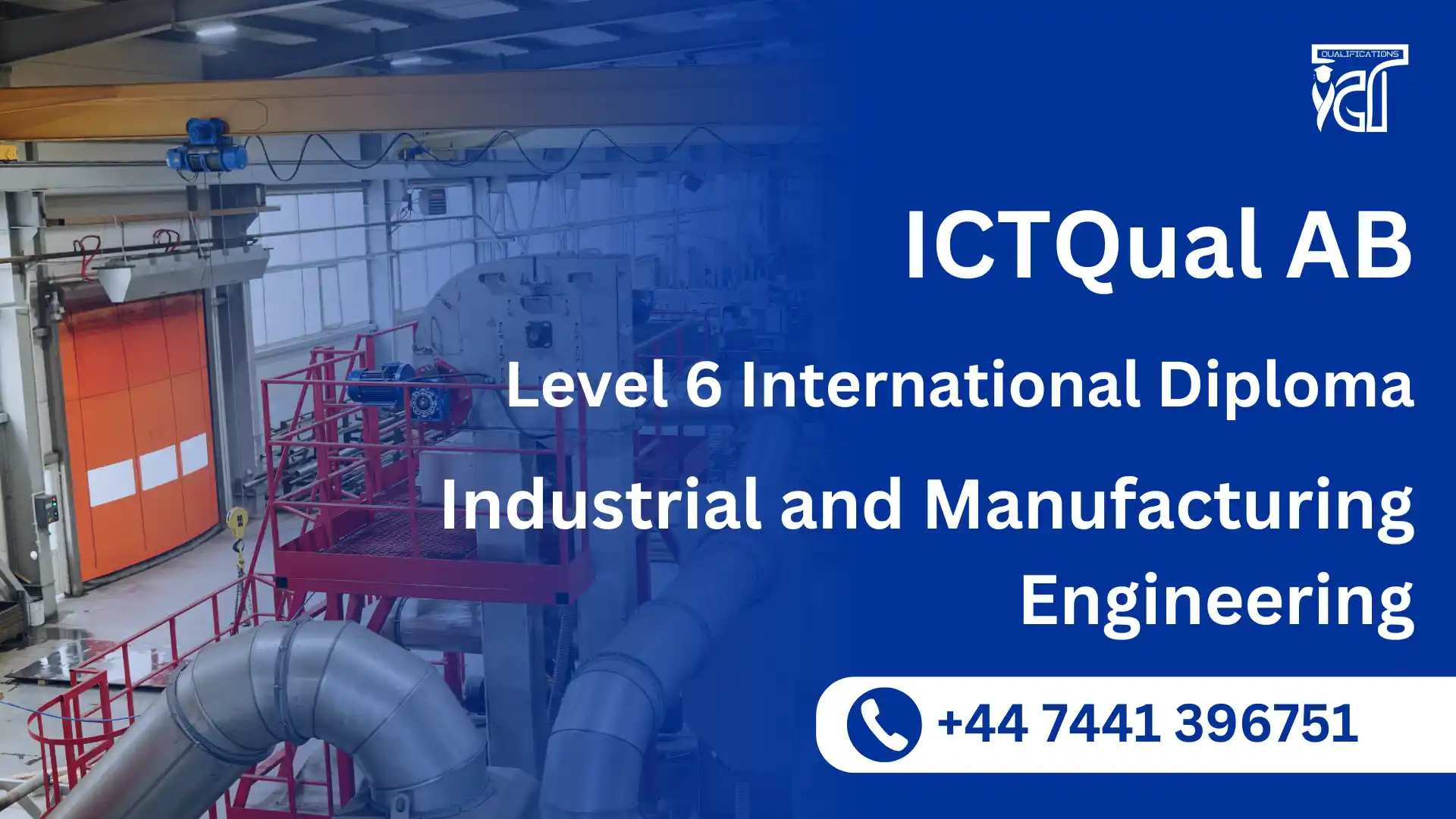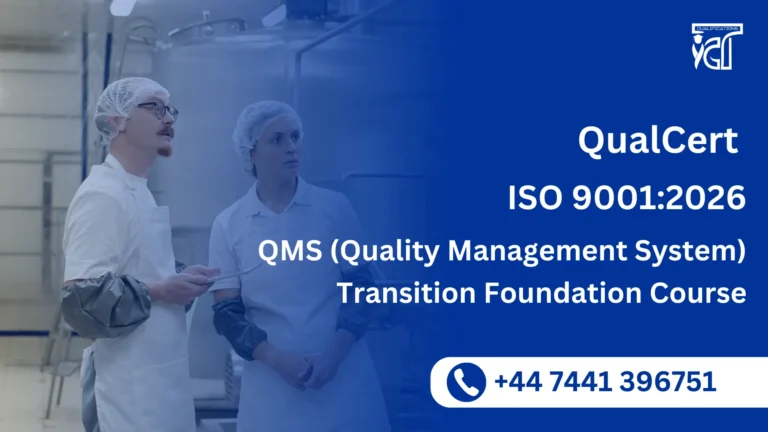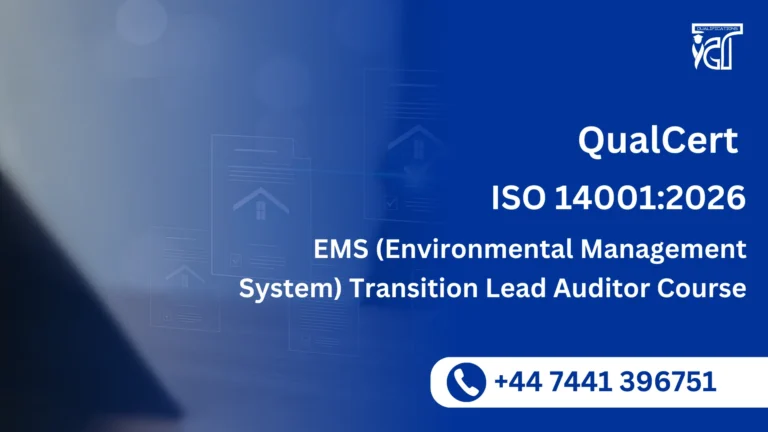The ICTQual AB Level 6 International Diploma in Industrial and Manufacturing Engineering is a comprehensive, industry-focused qualification designed for learners aiming to excel in advanced engineering and production environments. Structured across three years and totalling 360 credits, this diploma equips learners with the technical expertise, practical skills, and innovative mindset required to thrive in today’s competitive industrial and manufacturing sectors.
Ideal for both fresh learners seeking to build a strong foundation and experienced professionals aspiring to career growth, the programme blends rigorous academic knowledge with hands-on application. Learners will develop key competencies in production planning, process optimisation, quality control, automation, and sustainable manufacturing practices—skills that are highly sought after in global engineering and industrial markets.
The course provides learners with practical exposure to modern technologies, problem-solving strategies, and project management techniques, ensuring they are well-prepared to address real-world challenges in manufacturing operations and industrial systems. Graduates will be positioned for rewarding careers as Industrial Engineers, Manufacturing Managers, Process Improvement Specialists, or Production Supervisors in industries such as automotive, aerospace, electronics, and consumer goods.
Key benefits of completing this diploma include enhanced employability, the ability to lead and innovate within complex production environments, and a clear pathway to higher-level qualifications or specialised certifications. By mastering advanced tools, methodologies, and industry-relevant practices, learners can confidently pursue international opportunities and contribute to the evolution of efficient, sustainable manufacturing solutions. This diploma offers the essential blend of knowledge, skills, and professional recognition needed to succeed in the fast-paced world of industrial and manufacturing engineering.
ICTQual AB Level 6 International Diploma in Industrial and Manufacturing Engineering
This qualification, the ICTQual AB Level 6 International Diploma in Industrial and Manufacturing Engineering, consists of 36 mandatory units.
Year 1 – Foundation in Industrial and Manufacturing Engineering
- Principles of Industrial and Manufacturing Engineering
- Engineering Mathematics
- Fundamentals of Mechanical and Electrical Engineering
- Materials Science and Engineering
- Engineering Drawing and CAD
- Introduction to Manufacturing Processes
- Basics of Automation and Control Systems
- Production Planning and Operations Management
- Quality Fundamentals and Inspection Techniques
- Health, Safety, and Environmental Practices in Engineering
- Communication and Technical Report Writing
- Introduction to Project Management in Engineering
Year 2 – Intermediate Studies in Industrial and Manufacturing Engineering
- Manufacturing Systems and Technology
- Advanced Production Planning and Scheduling
- Lean Manufacturing and Continuous Improvement
- Industrial Automation and PLC Programming
- Supply Chain and Logistics Management
- Mechanical Design and Manufacturing Processes
- Industrial Maintenance and Reliability Engineering
- Computer-Aided Manufacturing (CAM)
- Data Acquisition and Process Monitoring
- Sustainable Manufacturing and Green Engineering
- Applied Research Methods in Engineering
- Human Factors and Ergonomics in Manufacturing
Year 3 – Advanced Studies in Industrial and Manufacturing Engineering
- Smart Manufacturing and Industry 4.0
- Advanced Manufacturing Technologies (Additive, CNC, etc.)
- Robotics and Autonomous Systems in Manufacturing
- Advanced Quality Management and Six Sigma
- Cyber-Physical Systems and IoT in Manufacturing
- Supply Chain Optimisation and Global Operations
- Advanced Process Engineering and Simulation
- Innovation and Product Development in Engineering
- Professional Ethics and Sustainability in Manufacturing
- Technology Entrepreneurship and Business Development
- Infrastructure and Facility Planning for Manufacturing Systems
- Final Year Major Project (Capstone Project)
Learning Outcomes for the ICTQual AB Level 6 International Diploma in Industrial and Manufacturing Engineering:
Year 1 – Foundation in Industrial and Manufacturing Engineering
Principles of Industrial and Manufacturing Engineering
- Understand the scope, principles, and applications of Industrial & Manufacturing Engineering.
- Explain the role of engineers in improving productivity and efficiency.
- Identify key functions within industrial and manufacturing systems.
Engineering Mathematics
- Apply algebra, calculus, statistics, and trigonometry to solve engineering problems.
- Use mathematical models to analyse industrial processes.
- Develop logical and numerical reasoning skills for technical problem-solving.
Fundamentals of Mechanical and Electrical Engineering
- Explain the principles of mechanics, motion, energy, and electrical circuits.
- Apply basic laws of thermodynamics and electricity to engineering systems.
- Use mechanical and electrical knowledge to support industrial processes.
Materials Science and Engineering
- Identify classes of engineering materials and their mechanical properties.
- Understand the relationship between material structure and performance.
- Select suitable materials for different manufacturing applications.
Engineering Drawing and CAD
- Interpret technical and engineering drawings to global standards.
- Create 2D and 3D models using CAD software.
- Apply principles of tolerancing, dimensioning, and design communication.
Introduction to Manufacturing Processes
- Understand manufacturing methods such as machining, casting, welding, and forming.
- Compare conventional and modern manufacturing techniques.
- Evaluate process selection based on cost, quality, and efficiency.
Basics of Automation and Control Systems
- Explain open-loop and closed-loop control systems.
- Identify basic sensors, actuators, and controllers.
- Apply control system principles to simple industrial processes.
Production Planning and Operations Management
- Understand the fundamentals of production planning and scheduling.
- Apply techniques for capacity planning, inventory management, and process flow.
- Analyse the role of operations management in achieving efficiency.
Quality Fundamentals and Inspection Techniques
- Explain the principles of quality management and assurance.
- Apply inspection methods and measurement techniques in manufacturing.
- Identify defects and recommend corrective actions.
Health, Safety, and Environmental Practices in Engineering
- Understand workplace safety regulations and engineering risk assessment.
- Apply hazard identification and mitigation measures.
- Demonstrate awareness of environmental sustainability in industrial contexts.
Communication and Technical Report Writing
- Develop professional written and verbal communication skills.
- Prepare structured technical reports and presentations.
- Apply correct referencing and technical documentation standards.
Introduction to Project Management in Engineering
- Understand the basics of project management in industrial contexts.
- Apply simple planning tools such as Gantt charts and work breakdown structures.
- Identify risks, budgets, and resource requirements in small-scale projects.
Year 2 – Intermediate Studies in Industrial and Manufacturing Engineering
Manufacturing Systems and Technology
- Understand integrated manufacturing systems and their functions.
- Evaluate the role of automation in system efficiency.
- Analyse case studies of modern manufacturing technologies.
Advanced Production Planning and Scheduling
- Apply advanced scheduling methods to optimise workflows.
- Use planning tools for forecasting and resource allocation.
- Analyse bottlenecks and recommend improvements.
Lean Manufacturing and Continuous Improvement
- Understand lean principles such as waste reduction and value stream mapping.
- Apply tools like Kaizen, 5S, and Six Sigma basics.
- Evaluate the impact of lean practices on productivity.
Industrial Automation and PLC Programming
- Explain the role of automation in industrial applications.
- Develop and test PLC programs for automated processes.
- Troubleshoot basic PLC-controlled systems.
Supply Chain and Logistics Management
- Understand supply chain structures and global logistics systems.
- Apply techniques for demand forecasting and distribution management.
- Analyse strategies for supply chain optimisation.
Mechanical Design and Manufacturing Processes
- Apply mechanical design principles to industrial components.
- Understand advanced processes such as casting, forging, and additive manufacturing.
- Evaluate designs for manufacturability and efficiency.
Industrial Maintenance and Reliability Engineering
- Apply preventive and predictive maintenance techniques.
- Analyse reliability models and equipment performance.
- Implement condition-based monitoring systems.
Computer-Aided Manufacturing (CAM)
- Use CAM software for part programming and production planning.
- Apply CNC programming for manufacturing applications.
- Integrate CAD and CAM systems to streamline design-to-production workflows.
Data Acquisition and Process Monitoring
- Explain the principles of data acquisition systems.
- Apply signal conditioning, sampling, and filtering techniques.
- Use software tools for process monitoring and analysis.
Sustainable Manufacturing and Green Engineering
- Understand the principles of eco-friendly manufacturing.
- Evaluate renewable resources and energy-efficient processes.
- Recommend sustainable strategies for industrial operations.
Applied Research Methods in Engineering
- Develop structured research proposals in engineering.
- Apply qualitative and quantitative methods to technical studies.
- Interpret data and present evidence-based findings.
Human Factors and Ergonomics in Manufacturing
- Understand the role of ergonomics in workplace design.
- Apply human factors to improve productivity and safety.
- Evaluate case studies of ergonomics in industrial settings.
Year 3 – Advanced Studies in Industrial and Manufacturing Engineering
Smart Manufacturing and Industry 4.0
- Understand digital manufacturing and cyber-physical systems.
- Apply IoT, AI, and big data in smart factory environments.
- Evaluate the challenges of transitioning to Industry 4.0.
Advanced Manufacturing Technologies (Additive, CNC, etc.)
- Analyse additive manufacturing techniques (3D printing).
- Apply CNC and advanced machining for precision engineering.
- Evaluate innovations in advanced materials processing.
Robotics and Autonomous Systems in Manufacturing
- Understand the role of robotics in industrial automation.
- Apply path planning and robotic control strategies.
- Evaluate autonomous systems in flexible manufacturing.
Advanced Quality Management and Six Sigma
- Apply advanced statistical quality control techniques.
- Implement Six Sigma tools for defect reduction.
- Evaluate continuous improvement initiatives.
Cyber-Physical Systems and IoT in Manufacturing
- Understand the integration of physical processes with digital networks.
- Apply IoT protocols for industrial monitoring and control.
- Design small-scale cyber-physical systems for engineering applications.
Supply Chain Optimisation and Global Operations
- Apply advanced supply chain modelling and optimisation tools.
- Analyse risks in global supply networks.
- Recommend strategies for efficiency and resilience.
Advanced Process Engineering and Simulation
- Use simulation tools for analysing industrial processes.
- Model material and energy flows in production systems.
- Evaluate process improvements using digital simulation.
Innovation and Product Development in Engineering
- Understand the stages of product design and innovation.
- Apply tools for prototyping and testing.
- Evaluate the commercialisation of engineering products.
Professional Ethics and Sustainability in Manufacturing
- Demonstrate understanding of ethical principles in Industrial & Manufacturing Engineering practice.
- Apply sustainability frameworks in manufacturing projects.
- Evaluate the social and environmental impact of industrial operations.
Technology Entrepreneurship and Business Development
- Understand principles of entrepreneurship and innovation management.
- Develop business models for engineering-based ventures.
- Apply strategies for technology commercialisation.
Infrastructure and Facility Planning for Manufacturing Systems
- Understand facility layout design and optimisation.
- Apply planning principles for efficient material and workforce flow.
- Evaluate infrastructure requirements for modern industries.
Final Year Major Project (Capstone Project)
- Undertake an independent engineering project.
- Demonstrate integration of multidisciplinary knowledge.
- Present findings through a professional technical report and oral defence.
The ICTQual AB Level 6 International Diploma in Industrial and Manufacturing Engineering is a comprehensive three-year, 360-credit programme designed to prepare learners for leadership roles in production, operations, and advanced engineering environments. This diploma blends theoretical understanding with practical expertise, equipping learners to meet the demands of global industrial and manufacturing sectors. Whether you are a fresh learner beginning your engineering journey or an experienced professional seeking to advance your career, this qualification provides the technical knowledge, problem-solving skills, and industry recognition essential for long-term success.
1. Comprehensive Technical Knowledge
- In-depth coverage of production planning, quality control, and process optimisation.
- Builds expertise in industrial automation, lean manufacturing, and sustainable practices.
- Integrates modern engineering tools, methods, and technologies.
- Encourages innovative thinking to address real-world manufacturing challenges.
- Provides a solid foundation for advanced studies or specialisations.
2. Industry-Relevant Practical Skills
- Hands-on projects and simulations based on real industrial scenarios.
- Develops problem-solving and decision-making skills under practical constraints.
- Prepares learners to manage and improve complex manufacturing systems.
- Strengthens teamwork and communication for collaborative work environments.
- Bridges academic learning with practical industry application.
3. Global Recognition and Career Advancement
- Recognised internationally for its relevance and quality in engineering and manufacturing.
- Opens opportunities for roles such as Industrial Engineer, Production Manager, or Process Improvement Specialist.
- Enhances employability across automotive, aerospace, electronics, and consumer goods sectors.
- Increases competitiveness in both local and international job markets.
- Supports career progression into supervisory or managerial positions.
4. Pathway to Higher Education and Professional Certifications
- Enables progression to Level 7 Postgraduate Diplomas or Master’s programmes.
- Meets requirements for professional certifications in industrial or manufacturing engineering.
- Strengthens university applications for advanced engineering qualifications.
- Offers opportunities for further specialisation in cutting-edge manufacturing technologies.
- Supports academic and research-based career paths.
5. Personal Development and Long-Term Success
- Develops leadership, project management, and organisational skills.
- Encourages adaptability to evolving technologies and industry practices.
- Builds confidence to lead innovation and efficiency improvements.
- Enhances critical thinking and analytical abilities for professional decision-making.
- Equips learners with future-ready skills for sustained career growth.
The ICTQual AB Level 6 International Diploma in Industrial and Manufacturing Engineering is designed for ambitious learners who are passionate about improving production systems, optimising processes, and driving innovation in global manufacturing industries. Whether you are starting your journey in engineering or looking to elevate your professional standing, this programme is tailored to support learners with diverse goals and backgrounds.
1. Fresh Engineering Enthusiasts
- Learners completing secondary education or equivalent qualifications.
- Passionate about entering industrial and manufacturing engineering fields.
- Eager to develop strong theoretical and practical foundations in production systems.
- Motivated to gain skills that lead to rewarding engineering careers.
- Interested in contributing to sustainable and efficient manufacturing practices.
2. Mid-Career Engineering Professionals
- Individuals already employed in manufacturing, production, or operations roles.
- Seeking to update their knowledge and align with modern industry standards.
- Aspiring to progress into supervisory, specialist, or managerial positions.
- Looking to expand their expertise in automation, lean practices, or quality control.
- Keen to validate their skills with an internationally recognised qualification.
3. Aspiring Innovators and Change-Makers
- Learners driven by innovation and problem-solving in industrial environments.
- Interested in improving operational efficiency and product quality.
- Motivated to lead initiatives that embrace cutting-edge manufacturing technologies.
- Keen to enhance project leadership and strategic planning abilities.
- Seeking to make a measurable impact on production processes and business outcomes.
4. Entrepreneurs and Business Owners
- Individuals planning to launch or expand businesses in manufacturing or engineering.
- Looking to gain technical and managerial expertise to support their ventures.
- Interested in understanding process optimisation for cost-effective operations.
- Eager to network within industrial and engineering communities.
- Aspiring to boost credibility with partners, clients, and stakeholders.
5. Internationally Focused Learners
- Professionals aiming for opportunities with multinational corporations.
- Seeking a qualification recognised worldwide for its quality and relevance.
- Motivated to compete in diverse and competitive global markets.
- Interested in collaborative projects with international engineering teams.
- Aspiring to shape the future of global industrial and manufacturing practices.
Completing the ICTQual AB Level 6 International Diploma in Industrial and Manufacturing Engineering provides learners with a robust platform for academic growth, career advancement, and international opportunities. With its three-year, 360-credit structure, the diploma prepares learners to take on senior responsibilities, specialise further, or pursue entrepreneurial ventures in the fast-evolving industrial and manufacturing sectors.
1. Progression to Higher Education
- Eligible for Level 7 Postgraduate Diplomas or Master’s degrees in Industrial Engineering, Manufacturing Engineering, or Operations Management.
- Strengthens applications for advanced research programmes or technical specialisations.
- Provides a strong foundation for doctoral-level study or academic teaching roles.
- Supports transition into interdisciplinary areas like Supply Chain or Systems Engineering.
- Meets entry requirements for globally recognised universities and institutions.
2. Career Advancement in Engineering and Manufacturing
- Opens opportunities for roles such as Industrial Engineer, Manufacturing Manager, or Process Improvement Specialist.
- Prepares learners for senior or specialist positions in global manufacturing firms.
- Enhances prospects for promotions or lateral moves into leadership and strategy-focused roles.
- Recognised by employers as evidence of advanced technical and managerial expertise.
- Increases competitiveness in high-demand industrial and production environments.
3. Specialisation in Emerging Technologies
- Enables further expertise in Automation, Robotics, Lean Manufacturing, or Smart Factories.
- Prepares learners to adopt and implement cutting-edge industrial technologies.
- Encourages participation in research and development of innovative manufacturing solutions.
- Positions learners to work on sustainability-driven or Industry 4.0 projects.
- Supports adaptation to rapidly evolving global engineering trends.
4. Entrepreneurship and Consultancy
- Equips learners to establish manufacturing consultancies or production-focused businesses.
- Builds confidence to develop innovative solutions for operational efficiency.
- Enhances decision-making and strategic planning for industrial ventures.
- Strengthens professional networks within engineering and manufacturing industries.
- Adds credibility with clients, investors, and business partners.
5. Professional Recognition and International Mobility
- Supports eligibility for professional engineering memberships or industry certifications.
- Facilitates employment with multinational corporations and participation in global projects.
- Enhances opportunities for consultancy roles in diverse industrial sectors.
- Prepares learners to collaborate across international markets and engineering teams.
- Positions graduates as competitive candidates in the global industrial and manufacturing workforce.
As an approved centre of ICTQual AB, we provide two tailored certification routes to suit learners with different levels of experience. By enrolling with us, learners are assured of high-quality training, expert guidance, and a globally respected qualification in industrial and manufacturing engineering.
Route 1: Experienced Professionals
- Designed for learners with at least six years of verifiable industry experience in manufacturing, production, operations, or related fields.
- Recognises prior expertise, enabling a fast-track pathway to complete the diploma.
- Focuses on advanced modules, applied projects, and leadership-level skills.
- Ideal for professionals seeking senior positions, career advancement, or international opportunities.
- Validates and enhances existing competencies with an internationally recognised credential.
Route 2: Fresh Learners
- Tailored for fresh candidates or learners with little to no industry experience.
- Requires the completion of 36 structured assignments to develop strong theoretical and practical foundations.
- Provides step-by-step guidance, mentorship, and resources to support learning.
- Prepares learners for successful entry into manufacturing and industrial engineering careers.
- Equips learners with the knowledge and confidence to progress to higher-level roles or further study.
Enrolling with our ICTQual AB-approved centre ensures that every learner—whether experienced or just starting their journey—receives comprehensive training, practical insights, and internationally recognised certification to excel in the competitive world of industrial and manufacturing engineering.
Entry Requirements
To ensure learners are fully prepared for the academic and technical demands of this programme, the following entry requirements apply:
Minimum Age
- Learners must be 18 years or older at the time of enrolment.
- This ensures a suitable level of maturity and readiness for advanced study.
Educational Background
- A Level 5 Diploma, Higher National Diploma (HND), or equivalent qualification in engineering, manufacturing, or a related discipline.
- Alternatively, completion of secondary education with strong grades in mathematics, physics, or technical subjects may be accepted for motivated learners.
- Applicants without formal qualifications may be considered based on relevant experience or prior learning.
Experience
- Route 1: At least six years of verifiable professional experience in industrial, manufacturing, or production-related fields for experienced learners.
- Route 2: No prior industry experience required for fresh candidates; learners will complete 36 structured assignments to build their knowledge base.
Language Proficiency
- Learners must demonstrate proficiency in English to ensure effective participation.
- Recommended standards include IELTS 5.5 or equivalent.
- Those without formal proof of English proficiency may undergo an internal assessment or provide evidence of prior education in English.
This structured entry framework ensures that every learner—whether an experienced professional or a fresh candidate—has the foundation needed to successfully complete the ICTQual AB Level 6 International Diploma in Industrial and Manufacturing Engineering.
Register Now
Qualification Process
Qualification Process for the ICTQual AB Level 6 International Diploma in Industrial and Manufacturing Engineering
- Self-Assessment:
Begin by evaluating your eligibility to ensure you meet the qualification requirements, including work experience, knowledge, and language proficiency. - Registration:
Complete your registration by submitting the required documents, including a scanned copy of a valid ID, and paying the registration fee. - Induction:
An assessor will conduct an induction to confirm your eligibility for the course and explain the evidence requirements. If you do not meet the criteria, your registration will be cancelled, and the fee will be refunded. - Assignments & Evidence Submission:
Provide all assignments and the necessary evidence based on the assessment criteria outlined in the course. If you are unsure of the required evidence, consult with the assessor for guidance on the type and nature of evidence needed. - Feedback and Revision:
The assessor will review your submitted evidence and provide feedback. Evidence that meets the criteria will be marked as “Criteria Met,” while any gaps will be identified. You will be asked to revise and resubmit if needed. - Competence Evidence:
Submit final evidence demonstrating that all learning outcomes have been met. This evidence will be marked as “Criteria Met” by the assessor once it is satisfactory. - Internal Quality Assurance (IQA):
The Internal Quality Assurance Verifier (IQA) will review your evidence to ensure consistency, quality, and compliance with standards. - External Verification:
The IQA will submit your portfolio to ICTQUAL AB External Quality Assurance Verifiers (EQA) for final confirmation. The EQA may contact you directly to verify the authenticity of your evidence. - Certification:
Upon successful completion of all checks, ICTQUAL AB will issue your official certificate, confirming that you have attained the ICTQual AB Level 6 International Diploma in Industrial and Manufacturing Engineering.







